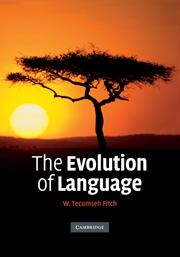Book contents
- Frontmatter
- Contents
- List of figures
- Acknowledgments
- Introduction
- SECTION 1 THE LAY OF THE LAND
- 1 Language from a biological perspective
- 2 Evolution: consensus and controversy
- 3 Language
- 4 Animal cognition and communication
- SECTION 2 MEET THE ANCESTORS
- SECTION 3 THE EVOLUTION OF SPEECH
- SECTION 4 EVALUATING PHYLOGENETIC MODELS OF LANGUAGE EVOLUTION
- Glossary
- Appendix: species names
- References
- Author index
- Subject index
- Species index
3 - Language
Published online by Cambridge University Press: 05 June 2012
- Frontmatter
- Contents
- List of figures
- Acknowledgments
- Introduction
- SECTION 1 THE LAY OF THE LAND
- 1 Language from a biological perspective
- 2 Evolution: consensus and controversy
- 3 Language
- 4 Animal cognition and communication
- SECTION 2 MEET THE ANCESTORS
- SECTION 3 THE EVOLUTION OF SPEECH
- SECTION 4 EVALUATING PHYLOGENETIC MODELS OF LANGUAGE EVOLUTION
- Glossary
- Appendix: species names
- References
- Author index
- Subject index
- Species index
Summary
On a fine spring afternoon in 1828, a shoemaker in the German town of Nuremberg encountered a strange sight: a young man waddling down the street with his arms outstretched, squinting and yelling incomprehensibly. When asked to explain himself, he stared uncomprehendingly, and only repeated his name – Kaspar Hauser – and the phrase “I want to be a horseman like my father.” He vomited when fed anything other than bread or water, but was taken in by a kindly scholar, Georg Daumer, in the town. Kaspar Hauser's saviors quickly learned that, despite his lack of knowledge of German or any other language, and a total inability to clothe or feed himself, Hauser was perceptive and intelligent, and a remarkably fast learner. Over the several years that Hauser lived with Daumer, he acquired a considerable vocabulary, some basic syntax, and the ability to read and write – enough to write a crude autobiography – along with the basic skills necessary to survive in normal society. As Hauser's language abilities grew, the horrible story of his life became clear in outline. From a young age, for as long as he could remember, Kaspar Hauser had been kept in a dark dungeon, with absolutely no social contact. His entire existence was confined to a windowless room with an earthen floor and a few wooden toys, with no verbal or physical contact with other humans.
- Type
- Chapter
- Information
- The Evolution of Language , pp. 73 - 142Publisher: Cambridge University PressPrint publication year: 2010
- 1
- Cited by

